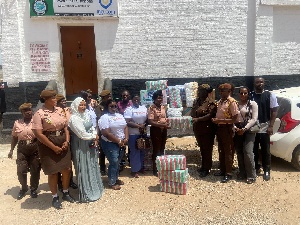- Home - News
- Elections 2024
- News Archive
- Crime & Punishment
- Politics
- Regional
- Editorial
- Health
- Ghanaians Abroad
- Tabloid
- Africa
- Religion
- Photo Archives
- Press Release
General News of Wednesday, 28 May 2025
Source: www.ghanawebbers.com
Nana Ampofoa Initiative tackles menstrual hygiene challenges among underprivileged female prisoners
Menstrual hygiene is a luxury for many female prisoners. They face overcrowding and lack of resources.
Without affordable sanitary products, these women struggle with menstrual hygiene. Many lack proper education on menstrual health as well.
A Superintendent at Kumasi Central Prison offers hope through the Nana Ampofoa Initiative. This initiative provides sanitary pads, education, and support for inmates' menstrual challenges.
In low-income societies, many girls and women cannot access basic sanitary materials. Some are forced to use cloth or unsafe materials, risking their health.
At Kumasi Central Prison, 1,600 inmates live in a facility meant for 500. Overcrowding creates discomfort and increases the risk of unhygienic complications during menstruation.
Dr. Kwame Aseidu Danso, an obstetrician gynecologist, emphasizes the importance of hygiene. He says poor hygiene can harm women's health and advocates for constant education.
“These women are underprivileged due to their situation,” he explains. “They cannot move freely and rely on donations for resources. Being confined increases infection risks, which is a public health concern.”
The Nana Ampofoa Initiative aims to address these issues at Kumasi Central Prisons.
Founded by Deputy Superintendent Roselyn Ampofoa Tweneboa Kodua, the initiative provides extensive hygiene education to female prisoners.
The program includes cervical cancer screenings and donations of sanitary pads, toiletries, and bottled water.
Inmates learn about menstruation, sexual health, and general wellness while dispelling misconceptions about menstrual practices.
Roselyn believes this intervention will restore dignity to female inmates and improve their menstrual health.
“This idea aims to brighten my little corner,” she says. “We keep improving every year; next year will be even better.”
She adds that many inmates lack knowledge about menstruation trends due to their conditions.
“I believe this initiative will inspire proper hygiene practices,” she states. “Thanks to our supporters like Hello Period and Ohemaa detergent for making this project possible.”
This outreach celebrated World Menstrual Hygiene Day.
James Mwinyelle is the Deputy Director of Prisons at Kumasi Central Prison. He appreciates the internal support from staff like Roselyn in addressing these issues.
“This intervention will help a lot,” he says proudly. “Roselyn has been instrumental in making progress.”
He acknowledges that female prisoners face unique challenges that require attention and support from within the prison system.











